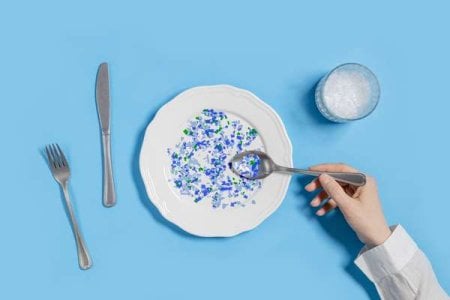Aussie Waterways Under Threat: Scientists Find Disturbing Evidence of a Growing Problem – Are You at Risk?
- Replies 6
Australia's waterways are facing a silent but significant threat that could have far-reaching consequences for the environment and human health. Conservationists and scientists are raising the alarm over the proliferation of microplastics, which are now being found in staggering quantities across the nation's coastal regions. With some areas recording up to 70,000 pieces of microplastics per square metre, the call for increased funding and awareness has never been more urgent.
Microplastics, tiny plastic fragments that can range from five millimetres down to less than one millimetre in size, are infiltrating our oceans, lakes, and lagoons at an alarming rate. Dr Michelle Blewitt from the Australian Microplastic Assessment Project (AUSMAP) has highlighted the severity of the issue, pointing out that these plastics are not just a local problem but a global crisis. An estimated 5.25 trillion plastic particles are floating on the surface of the ocean worldwide, weighing a combined 269,000 tonnes – the equivalent of over 2,000 blue whales.
The impact of microplastics on Australian waterways is multifaceted. These plastics enter the ecosystem through various channels, including the simple act of washing clothes, which releases millions of microfibres into the water system. Once in the water, these plastics become part of the food chain, consumed by fish and other aquatic life. This, in turn, poses a risk to humans who consume seafood, as we inadvertently ingest these plastics along with our meals.

In South Australia, particularly at West Lakes in Adelaide, the issue of microplastic pollution is especially pronounced. Blewitt emphasizes that now is the time for decisive action. Microplastics and even smaller nanoplastics and picoplastics are becoming so pervasive that they are being inhaled by humans, with the potential to cause a range of health issues.
The resemblance of microplastics to natural prey is deceiving wildlife into consuming them, often leading to the ingestion of harmful chemicals that plastics attract, like magnets. These chemicals include DDTs, runoff from local sources, and other contaminants that can be harmful when consumed.
The problem extends beyond the marine environment, with microplastics being discovered within human tissues. Studies have found plastics in everyday items like salt and honey, and even in human organs and tissues, including testicles and brain tissue, raising concerns about fertility and overall health.
The situation is dire, and Australians are urged to scrutinize their plastic use. Education is key to understanding the extent of one's plastic footprint and making the necessary changes to minimize it. Small programs dedicated to monitoring and assessing microplastic pollution are vital, but they require support to continue their important work.
As we marvel at Australia's unique and diverse environment, it's crucial to recognize the threats it faces and take action to protect it. Reducing our reliance on plastics and supporting conservation efforts are steps we can all take to safeguard our waterways for future generations.
 We at the Seniors Discount Club invite you to reflect on your own use of plastics and consider how you can contribute to the solution. Have you noticed changes in your local waterways? Are you taking steps to reduce your plastic consumption? Share your thoughts and experiences in the comments below, and let's work together to preserve the natural beauty of our beloved Australia.
We at the Seniors Discount Club invite you to reflect on your own use of plastics and consider how you can contribute to the solution. Have you noticed changes in your local waterways? Are you taking steps to reduce your plastic consumption? Share your thoughts and experiences in the comments below, and let's work together to preserve the natural beauty of our beloved Australia.
Microplastics, tiny plastic fragments that can range from five millimetres down to less than one millimetre in size, are infiltrating our oceans, lakes, and lagoons at an alarming rate. Dr Michelle Blewitt from the Australian Microplastic Assessment Project (AUSMAP) has highlighted the severity of the issue, pointing out that these plastics are not just a local problem but a global crisis. An estimated 5.25 trillion plastic particles are floating on the surface of the ocean worldwide, weighing a combined 269,000 tonnes – the equivalent of over 2,000 blue whales.
The impact of microplastics on Australian waterways is multifaceted. These plastics enter the ecosystem through various channels, including the simple act of washing clothes, which releases millions of microfibres into the water system. Once in the water, these plastics become part of the food chain, consumed by fish and other aquatic life. This, in turn, poses a risk to humans who consume seafood, as we inadvertently ingest these plastics along with our meals.

Conservationists are calling for more government funding to address the severe microplastics contamination in Australian waterways. Credit: Shutterstock
In South Australia, particularly at West Lakes in Adelaide, the issue of microplastic pollution is especially pronounced. Blewitt emphasizes that now is the time for decisive action. Microplastics and even smaller nanoplastics and picoplastics are becoming so pervasive that they are being inhaled by humans, with the potential to cause a range of health issues.
The resemblance of microplastics to natural prey is deceiving wildlife into consuming them, often leading to the ingestion of harmful chemicals that plastics attract, like magnets. These chemicals include DDTs, runoff from local sources, and other contaminants that can be harmful when consumed.
The problem extends beyond the marine environment, with microplastics being discovered within human tissues. Studies have found plastics in everyday items like salt and honey, and even in human organs and tissues, including testicles and brain tissue, raising concerns about fertility and overall health.
The situation is dire, and Australians are urged to scrutinize their plastic use. Education is key to understanding the extent of one's plastic footprint and making the necessary changes to minimize it. Small programs dedicated to monitoring and assessing microplastic pollution are vital, but they require support to continue their important work.
As we marvel at Australia's unique and diverse environment, it's crucial to recognize the threats it faces and take action to protect it. Reducing our reliance on plastics and supporting conservation efforts are steps we can all take to safeguard our waterways for future generations.
Key Takeaways
- Conservationists are urging increased government funding to tackle the severe problem of microplastics in Australian waterways, with some areas exhibiting extreme levels of contamination.
- Dr Michelle Blewitt from AUSMAP highlighted the urgent need for better education and awareness to prevent plastics from entering oceans and affecting both marine life and human health.
- Microplastics enter waterways through various means, including washing clothes, and end up being consumed by marine species and, subsequently, humans.
- Microplastics have not only been found in food sources but also within human tissues, raising concerns about potential health impacts, including fertility and cardiovascular issues.







